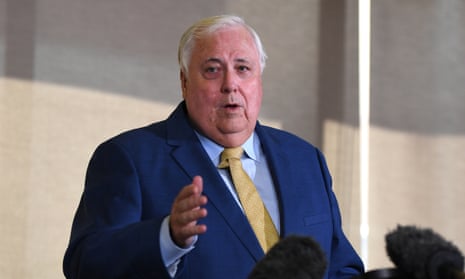Clive Palmer requested that his name and logo be printed on 33m doses of hydroxychloroquine that he donated to the Australian medical stockpile last year as a potential treatment for Covid-19.
Correspondence obtained by the Guardian under freedom of information laws reveals the former MP told health department officials he would source the anti-malarial drugs from China on condition that a “small copy” of the Palmer Foundation logo was printed on the packets, along with a message stating they had been “donated by the Palmer Foundation for the benefit of the Australian people”.
The Palmer Foundation is a private philanthropic entity set up and headed by Palmer.
The department refused the request, telling Palmer the labelling would breach Australia’s strict laws on medical packaging. A senior government official suggested that the health minister, Greg Hunt, could instead “publicly acknowledge the donation on a major TV or press interview” once the hydroxychloroquine was in use. Palmer subsequently agreed to supply the drugs without any mention of his foundation on the labels.
The donated drug was intended for use with Australian Covid-19 patients if trials proved it to be an effective treatment. However, hydroxychloroquine was soon shown to be ineffective as a remedy for Covid-19, and Palmer’s drugs were never used outside clinical trials.
The documents show health department officials worked with Palmer to source more than five tonnes of hydroxychloroquine and chloroquine diphosphate (a related chemical) between April and June 2020, purchased from China through a subsidiary of the Palmer Foundation called Consolidated Pharmaceuticals.
In a letter dated 30 March, the head of the Therapeutic Goods Authority (TGA), John Skerritt, told Chinese suppliers that Palmer was authorised to buy the goods “under an arrangement with the Australian government” and the medicines would remain “at all times under the control of the Australian government and their medical officers”.
In a separate letter sent the same day, Skerritt thanked Palmer “for what you are doing to secure … a medicine which may prove important as a treatment for Covid-19”.
Palmer announced the donation on 28 April via a three-page advertisement in News Corp publications in which he said he purchased 32.9m doses of the drug “so it may be available free to all Australians”.
However, by the end of May, the government’s enthusiasm for hydroxychloroquine was waning in the face of mounting evidence that the drug was ineffective as a treatment for Covid-19 and in some cases potentially harmful, and Palmer was told that batches of donated hydroxychloroquine that were not already in transit were no longer wanted.
“As we discussed earlier today, given the low rates of Covid-19 infection in Australia and the status of clinical trials nationally, we believe that there are sufficient stocks in Australia such that further donations to the national medical stockpile of hydroxychloroquine or chloroquine products are not required at this stage,” the Department of Health acting secretary, Caroline Edwards, told Palmer in a letter dated 29 May 2020.
But a final batch of 1000kg of hydroxychloroquine sulfate – the equivalent of 5m single doses – arrived at Melbourne airport in August, leading to a bizarre standoff between Palmer and the TGA over who would take ownership of the delivery.
“We understand the final shipment of donated products (1,000kg hydroxychloroquine sulfate) has now arrived at Melbourne airport,” the Palmer Foundation told Skerritt in a letter dated 18 August 2020. “The Palmer Foundation and Consolidated Pharmaceuticals has no ownership or interest in the property (it is the property of the commonwealth) [and] we expect your office … to facilitate the product being placed on the national stockpile.”
Skerritt replied the same day to say the health department was also washing its hands of the unwanted medicines. “As you are aware, almost three months ago, on 29 May 2020, the acting secretary of the health department wrote to the Palmer Foundation and thanked them for their generous donations of chloroquine and hydroxychloroquine to the national medical stockpile but indicated that given the levels of current supplies, the department (on behalf of the stockpile) did not wish to receive further supplies,” Skerritt wrote. “In your letter today you mention that an additional 1000kg of product has arrived at Melbourne airport. As previously advised and agreed by you, we are unable to take possession of this material.”
In response, the Palmer Foundation wrote to both Skerritt and Hunt to incorrectly claim that “the efficacy of hydroxychloroquine is now well established internationally” and to urge the government to take possession of the shipment. “We have no control over your chosen actions with your property but we suggest it be placed on the national stockpile as it will likely be required by the Australian population in the future,” the foundation said.
The department told Guardian Australia the final batch of hydroxychloroquine sulfate was never accepted by the national medical stockpile, and it was unaware what happened to the product.
Palmer did not respond to questions about the fate of the abandoned shipment.
In August 2020, the TGA strongly advised against hydroxychloroquine being used to treat Covid-19 outside clinical trials. Hydroxychloroquine remains an approved treatment in Australia for autoimmune disorders and malaria when prescribed by an authorised health professional.
